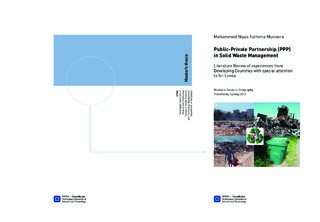| dc.contributor.advisor | Aasetre, Jørund | nb_NO |
| dc.contributor.author | Muneera, Mohammed Niyas Fathima | nb_NO |
| dc.date.accessioned | 2014-12-19T14:26:13Z | |
| dc.date.available | 2014-12-19T14:26:13Z | |
| dc.date.created | 2013-04-24 | nb_NO |
| dc.date.issued | 2012 | nb_NO |
| dc.identifier | 617746 | nb_NO |
| dc.identifier.uri | http://hdl.handle.net/11250/265466 | |
| dc.description.abstract | The study deals with the Public – Private Partnership (PPP) in solid waste management (SWM) in developing nations. In many developing countries, over the few decades partnership is taking more significant role in infrastructure development and providing services regarding SWM while government ownership has declined. At present PPP is considered as an important model for urban development. It has been found that privatisation or partnership can be used as a good policy to improve economic growth. PPPs is also said to enhance social infrastructure in a sustainable way. Therefore the purpose of the study is to find out practically how PPP works in SWM in developing countries and specifically in the Sri Lankan context.
An actor-oriented theory has been used, in order to explain the actors and their behaviour. New Public Management theory has been used to describe management of public services carried out by the private sector with management changes. Mainly, secondary data were used to get understanding of the PPP in SWM and to find out the developing nations’ experiences in PPP.
The study reveals that due to weaknesses in the public sector such as inefficiencies, wastefulness, carelessness, weakness in service delivery and provision of low quality goods for high rates, developing nations face problems to manage the waste properly. So, governments in developing nations have increased the involvement of the private sector to provide SWM services. Thus developing countries have introduced PPP as an alternative solution to manage waste. Also the study found that the governments alone could not deliver effective and valuable services. With the introduction of PPP, the partner could supply SWM services more effectively and cheaply. However, it has been found that, if there is no good supportive environment, then the partner has difficulty to manage the waste leading to failure in the project. | nb_NO |
| dc.language | eng | nb_NO |
| dc.publisher | Norges teknisk-naturvitenskapelige universitet, Fakultet for samfunnsvitenskap og teknologiledelse, Geografisk institutt | nb_NO |
| dc.title | Public-Private Partnership (PPP) in Solid Waste Management: Literature Review of experiences from Developing Countries with special attention to Sri Lanka | nb_NO |
| dc.type | Master thesis | nb_NO |
| dc.contributor.department | Norges teknisk-naturvitenskapelige universitet, Fakultet for samfunnsvitenskap og teknologiledelse, Geografisk institutt | nb_NO |
